Totland favoured delicate piano work, field records and an eclectic array of both acoustic and electronic sounds from around the world to create atmospheric cinematic tableaux on his exquisite collaborative Nest project with Serein label-owner Huw Roberts. Meanwhile, Skodvin furthered the mission of his own Miasmah imprint with increasingly dark, tortured and tortuous doom-laden dark ambient and drone music that began with his debut sonic field trip Knive under the Svarte Greiner moniker.
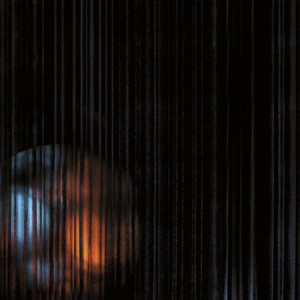
Deaf Center :: Owl Splinters [Purchase]
A gaping six year chasm separates the release of Deaf Center‘s hugely influential and much loved debut album Pale Ravine from Owl Splinters, anticipation for which has undoubtedly snowballed, accumulated alarmingly high levels of expectation. Not that the duo have been silent in the interim, quite the reverse in fact, and while Skodvin has been more prolific than Totland, both have produced some amazing and increasingly divergent releases, revealing who was responsible for what on both Pale Ravine and their debut EP release Neon City. Totland favoured delicate piano work, field records and an eclectic array of both acoustic and electronic sounds from around the world to create atmospheric cinematic tableaux on his exquisite collaborative Nest project with Serein label-owner Huw Roberts. Meanwhile, Skodvin furthered the mission of his own Miasmah imprint with increasingly dark, tortured and tortuous doom-laden dark ambient and drone music that began with his debut sonic field trip Knive under the Svarte Greiner moniker.
Owl Splinters may see them leaving behind the modest production techniques and heavily software-based synthesiser sounds they had at their disposal to make Pale Ravine in favour of a professional studio environment (Nils Frahm’s Durton studio in Berlin to be exact), an improvisational framework and a large helping of live acoustic instrumentation and analog hardware, but has it come at the expense of the soul and atmosphere that made their debut such a huge success? Have the duo travelled too far along their divergent musical paths to come together again and create something that is truly Deaf Center? Well, yes… and no.
The production values on Owl Splinters are impeccable but that doesn’t stop the overall experience from occasionally sounding more like an artistic collision than a successful collaboration. While it would be pointless to simply make another Pale Ravine or Neon City, too often Skodvin feels like the dominant partner, his propensity for torturing string instruments and then sadistically hurling the mauled remains at an unsuspecting public crop up all too often here, shifting the Deaf Center sound a little too closely towards his own solo Svarte Greiner output.
From the moment the splintered cellos of “Divided” invade your personal listening space it is clear that this is not the same Deaf Center of old. Strands of DNA from Richard Skelton, Goldmund, Machinefabriek and indeed Nils Frahm’s DNA have all become interwoven with Skodvin and Totland’s and once the hesitantly bowed strings are joined by seared bass washes and a deep, cold vocal yawing this now highly evolved and cross-bred Deaf Center sports a mad stare and ragged teeth that were never visible before. Listening to “Animal Sacrifice,” for example, is like being tied to a chair of human bones with piano wire and forced to listen to the sound of the charred remains of a broken violin being scraped up and down a chalkboard.
“New Beginning (Tidal Darkness)” has both a title and content that screamed to be used to open the album, but instead is lolling around after the first of Totland’s solo piano pieces. It is on this track that the duo are clearly gelling again, the qualities that made Pale Ravine so successful coming to the fore within these new Deaf Center parameters. More cello drones underpin low end piano keys and the clatter of rain in the gutter creates a genuine tension and drama, the analog hardware and acoustic instruments breathing a life and realism into the piece that would have been sorely missed otherwise.
And then we have “The Day I Would Never Leave,” which may just be the towering high point of their career. The first few moments are characterized by a mournful, defeated piano solo floating through a field recording of a soft breeze and distant, crumpled chopping, more bowed strings sawing low in the mix and a choral wail far in the distance, but the piano is soon submerged and the shattered and splintered strings take centre stage in a four minute dirge of slowly building tension, a glowering heat haze distorting everything around it. Its grip is only released eight and a half minutes in, falling away to reveal a relieved euphoria and a pleasant trickle of light piano keys. The track even runs into a locked groove on the vinyl version, that windy crackle and rustle looping into infinity. Or there’s the faultless closing piece, “Hunted Twice,” which again recalls Richard Skelton in its evocation of woodland or moorland spaces through bowed instruments and subtle field recordings, Totland’s piano hanging in unmoving, misty space.
One particular word comes to mind when describing, and that is “short,” a characteristic that is at least partially explained by the fact that the album was constructed from a series of improvisations carried out over only a few days in the studio. The two piano solo pieces “Time Spent” and “Fiction Dawn” are very pretty, but so slight and disconnected from the other denser material on offer that on an album this compact are hard to get excited about. You’d also think that repeating oneself on an album this short would be definite no-no, yet there’s a creeping sense of dej-vu on “Close Forever Watching,” as it repeats the building, quivering drones of “The Day I would Never Have.” A dense cloud of noise reaches its flaring peak about five minutes in as a single booming piano key cuts the sound levels right back, but instead of moving into new sonic territory, the track simply goes nowhere, the exact same drone fading back up and limping to a halt a few minutes later. For all its densely layered intensity and mesmerising sonic textures, it is actually slightly annoying after the first listen knowing that the track is not actually going to do anything.
Owl Splinters is both of a triumph of style over substance and of quality over quantity, its eight tracks both epic and vignette creating beautifully produced sonic pathways that a little too often lead into unexpected thematic cul-de-sacs that belie the improvisational nature of their composition. ‘Owl Splinters’ is an obviously essential purchase for Skodvin and Totland fans and though it may not gel a hundred percent as a standalone album, occasionally losing itself in a thorny forest of unfinished ideas, there is enough stunningly beautiful material here to justify your attention. A predictable follow up to Pale Ravine it is not.
[soundcloud url=”http://api.soundcloud.com/playlists/560523″ params=”show_comments=true&auto_play=false&show_playcount=true&show_artwork=true&color=000000″ width=”100%” height=”245″ ]
:::….:.:::….:::::::..:::::…..::..::::…::::.:.::::..:::…:::….:::.::::.:.::.:::.:::.:::…:::..::…::
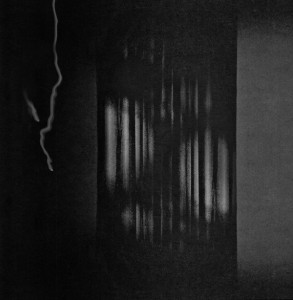
Svarte Greiner :: Twin
John Twells passion for vinyl means that it is these editions of Type’s releases that are considered to be the “master.” They are always made available ahead of the compact disc and digital formats, and are always sumptuously put together. No surprise, then, that Deaf Center get the premier vinyl treatment for Owl Splinters, the first edition of one hundred copies on clear vinyl and second of six hundred on black vinyl released with a bonus album on compact disc (a frequent Type release strategy now) entitled Twin by Svarte Greiner, described on the slipcase packaging as “The limping twin brother of Owl Splinters.”
Taking the form of a single forty-five and a half minute reinterpretation of the main album that sets the original session recordings in a characteristically bleak and harrowing context, this is probably the most closely linked bonus disc release Type have put out since Yellow Swans’ Being There. Featuring eerie monochrome artwork that re-uses that odd image of what looks like a distorted face peering through a curtain and now looks like it is disappearing into the 1960’s Doctor Who credits sequence, it further emphasizes Skodvin’s dominant role in the Owl Splinters project, and though the one-track nature of Twin‘s presentation may serve to undermine its significance, this is no minor work by any stretch of the imagination.
The first fifteen minutes are a true test of the listener’s mettle, opening with the sinister choral drones from “Divided” before blasting the listener with a solar storm of cello disintegrating intensity. You can literally hear the instrument roaring for release as the scorching feedback and noise raises bubbling welts in the varnish and peels the paint off the walls.
Once this ordeal by fire is over the piece settles into swathes of sweeping, majestic strings, dank and hopeless ghostly ambiance, rusty scraping and creaking, and an all-pervading Lynchian suggestion that there’s something horrific and quite, quite mad behind the curtain, down the darkened corridor, through the trees, around the corner, behind you, in the shadows, in your room…
If the wavering heat haze that clouded the drones in “Close Forever Watching” was suffocating, the levels experienced in the funereal organ-like dirge of “Twin”‘s final movement reach terminal levels, conjuring baked and blasted landscapes of hot, twisted metal, scorched earth and limping figures in the distance.
Not for the faint-hearted, Twin is a challenging listen that veers unexpectedly and unforgivingly from haunted dark ambient to nerve-shredding acoustic noise with typical Svarte Greiner aplomb making the vinyl + compact disc release definitely worth seeking out. Just brace yourself.
Note that a third, translucent orange vinyl edition of Owl Splinters has also been released, but is not accompanied by the bonus Twin disc.
Both releases are out now on Type.






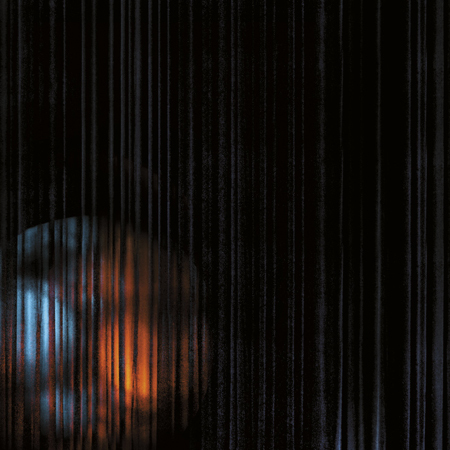





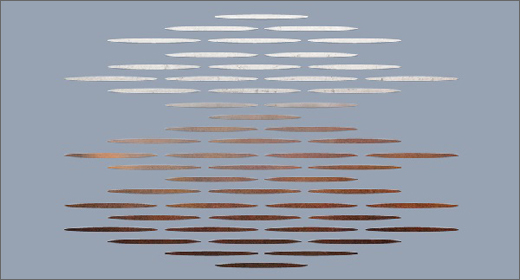
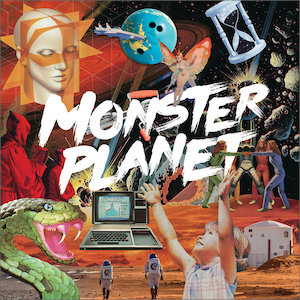



![Luke’s Anger :: Ceiling Walker EP (Love Love) — [concise]](https://igloomag.com/wp/wp-content/uploads/2025/04/lukes-anger-ceiling-walker-vinyl_feat-75x75.jpg)

![Ndorfik & madebyitself :: Solos EP (People Can Listen) — [concise]](https://igloomag.com/wp/wp-content/uploads/2025/04/ndorfik-madebyitself-solos_feat-75x75.jpg)



